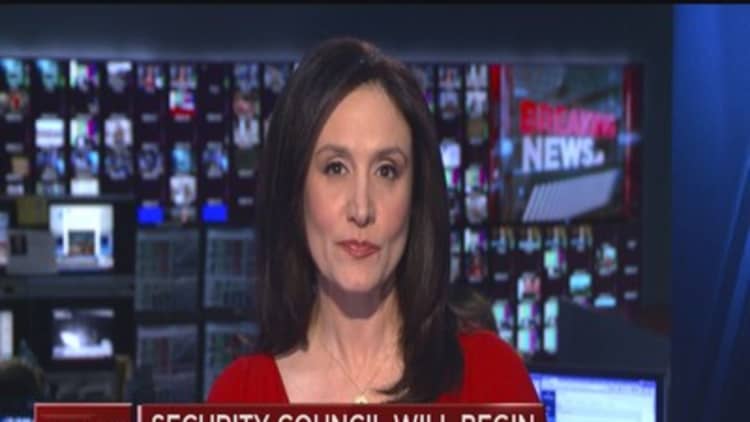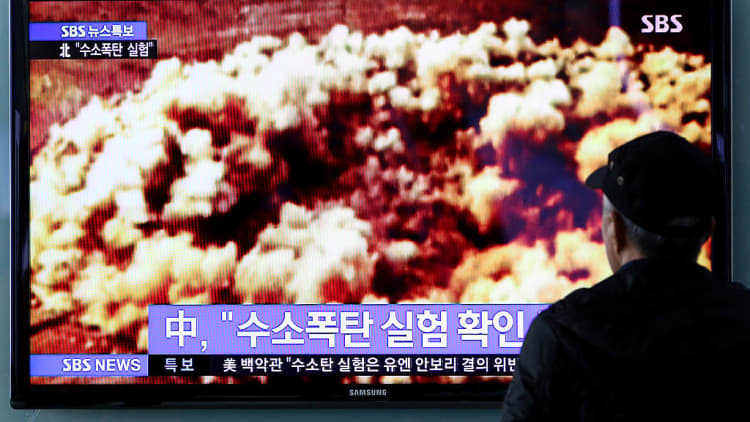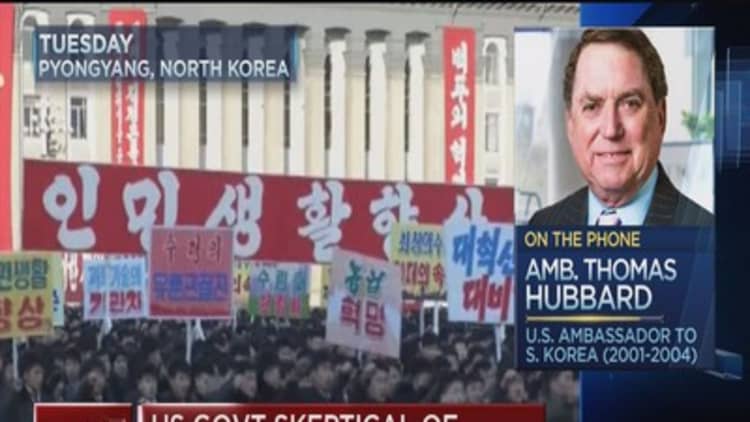




The United Nations Security Council on Wednesday condemned a North Korean nuclear test and said it would immediately start work on new "measures" against the country.
The statement, which followed an emergency meeting, came after leaders around the globe slammed Pyongyang's claims of a hydrogen bomb test and the potential threat it poses. The council called it a violation of previous resolutions and a "clear threat to international peace and security."
North Korea earlier announced that it conducted a miniaturized hydrogen bomb test. If verified, the trial raises the politically isolated country's nuclear capabilities and potential threat to the wider world, particularly if the bomb could be attached to a missile.
"With the perfect success of our historic H-bomb, we have joined the rank of advanced nuclear states," North Korean state television said, according to AFP. It added that the test was "an act of self-defense" against the U.S.
News of the test claims — which experts have not yet verified — quickly drew condemnation from North Korea's nearest neighbors and beyond.
The White House said any kind of nuclear test is "provocative and a flagrant violation" of U.S. Security Council resolutions, according to Reuters.
U.S. State Department spokesman John Kirby said officials could not confirm the H-bomb claims, but stressed that the U.S. condemns violations of Security Council resolutions.
"We will continue to protect and defend our allies in the region, including the Republic of Korea, and will respond appropriately to any and all North Korean provocations," he said.
United Nations Secretary-General Ban Ki-moon called the North Korean claim "deeply troubling" and "profoundly destabilizing for regional security."
"This test once again violates numerous Security Council resolutions despite the united call by the international community to cease such activities," he told reporters. "It is also a grave contravention of the international norm against nuclear testing."
Showing that the tide may be turning against North Korea, even China — a traditional ally of Pyongyang — appeared to be tiring of its ambitions. Foreign Ministry spokeswoman Hua Chunying said the government in Beijing "strongly opposes" it and urged North Korean leader Kim Jong Un to "stop any action which could worsen the situation," according to NBC News.
'Grave provocation'
South Korean President Park Geun-hye was quick to criticize her northern neighbor, calling the test a "grave provocation to this country's security." She added that her government would work closely with the international community to ensure that North Korea would "pay the price for conducting a nuclear weapons test," according to a statement on the government's website.
Japanese Prime Minister Shinzo Abe denounced the act, calling it a "grave threat to our nation and one we cannot accept," according to NBC.
The North Korean communist regime, led by Kim Jong Un, has long faced U.S. and U.N. sanctions due to its previous nuclear tests and missile programs. International backlash has not stopped North Korea from bellicose rhetoric against the West or continuing its pursuit of nuclear weaponry. Wednesday's nuclear trial was Pyongyang's fourth since 2006.
The U.K.'s Foreign Secretary Philip Hammond said the test "underlines the very real threat that North Korea represents to regional and international security."
Fellow Security Council member Russia also condemned the bomb test, saying it would amount to a gross violation of international law if confirmed, Reuters reported. The news agency also said Russia's U.N. envoy called for "cool heads" and a "proportionate response."
The test was also met with skepticism. U.S. government experts do not believe the device was a hydrogen bomb, and determining the precise nature of the test will take several days, government sources told Reuters.
South Korea's spy agency also cast doubt on the authenticity of the H-bomb, saying its neighbor may have tested an atomic bomb, The Associated Press reported.
Flouting the ban
Campaigners against the testing of nuclear weapons also slammed the North Korean announcement.
Although North Korea's latest test has drawn widespread concern, it is by no means the only country capable of launching a nuclear weapon. The nine nuclear countries, which include the U.S., Russia, U.K., France, China, India, Pakistan and Israel, possess more than 15,000 nuclear weapons altogether, according to the International Campaign to Abolish Nuclear Weapons.
The U.S. last conducted a nuclear weapons test in 1992, while China last did so in 1996. India and Pakistan last ran a nuclear test in 1998.
But North Korea has continued to flout the test-ban treaty in what is seen as a way for the hostile state to remind the rest of the world of its presence and nuclear capabilities.
— Reuters contributed to this report.



